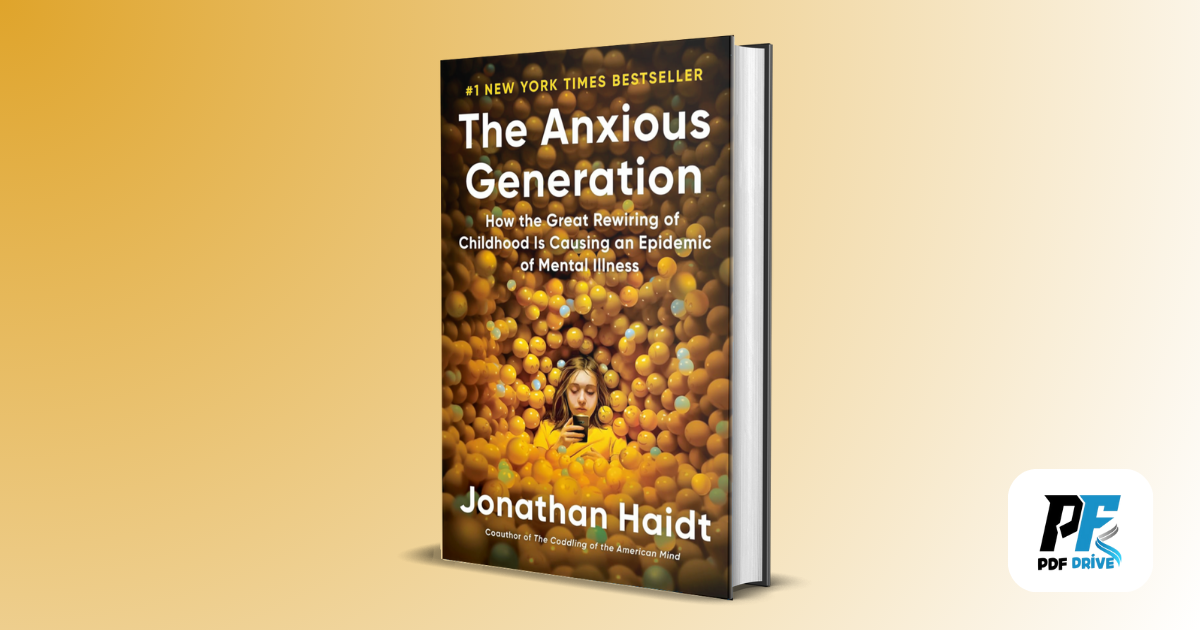The Anxious Generation: A Comprehensive Summary

Introduction
"The Anxious Generation: How the Great Rewiring of Childhood Is Causing an Epidemic of Mental Illness" is a thought-provoking exploration of the modern challenges facing today's youth. This book delves into the complex interplay between technological advancements, societal changes, and the mental health of children and adolescents. By examining the "great rewiring" of childhood experiences, the author presents a compelling argument for how these shifts are contributing to an alarming rise in anxiety, depression, and other mental health issues among young people.
The Great Rewiring: Understanding the Phenomenon
Digital Natives in a Rapidly Changing World
The book begins by setting the stage for what the author terms "the great rewiring." This concept refers to the fundamental changes in how children and teenagers experience the world, largely due to the pervasive influence of technology and social media. Key points include:
- The unprecedented access to information and connectivity that today's youth experience
- The shift from primarily face-to-face interactions to digital communications
- The impact of constant stimulation and instant gratification on developing brains
The Reshaping of Childhood Experiences
The author argues that traditional childhood experiences are being dramatically altered, leading to:
- Reduced unstructured play time
- Decreased face-to-face social interactions
- Altered sleep patterns due to device usage
- Changes in family dynamics and parenting styles
The Rise of Mental Health Concerns
Alarming Statistics
The book presents compelling data showcasing the increase in mental health issues among young people:
- Rising rates of diagnosed anxiety disorders in children and adolescents
- Increased prevalence of depression among teenagers
- Growing numbers of youth seeking mental health treatment
Potential Causes
The author explores various factors contributing to this mental health epidemic:
-
Social Media and Self-Image
- The pressure of constant comparison
- The impact of likes, shares, and online validation on self-worth
- Cyberbullying and its psychological effects
-
Academic Pressure
- Increased competition for college admissions
- Standardized testing stress
- Overloaded schedules with extracurricular activities
-
Parenting Styles
- The rise of helicopter parenting
- Decreased autonomy and problem-solving opportunities for children
- Overprotection leading to reduced resilience
-
Societal Factors
- Economic uncertainty and its impact on family stress
- Political polarization and its effect on young minds
- Environmental concerns and eco-anxiety
The Neurological Impact
Rewiring the Developing Brain
A significant portion of the book is dedicated to exploring how modern childhood experiences are literally rewiring young brains:
- The impact of screen time on attention span and cognitive development
- How social media usage affects reward centers in the brain
- The relationship between digital multitasking and anxiety
Sleep Disruption and Mental Health
The author emphasizes the crucial role of sleep in mental health and how it's being disrupted:
- The effect of blue light from screens on melatonin production
- How lack of quality sleep contributes to anxiety and depression
- The vicious cycle of sleep problems and mental health issues
Case Studies and Personal Stories
To illustrate the real-world impact of these issues, the book includes several case studies and personal narratives:
- Emily's Story: A 14-year-old girl struggling with social anxiety exacerbated by social media use
- The Johnson Family: How constant connectivity has altered family dynamics and communication
- Mark's Journey: A high school senior's battle with academic pressure and depression
These stories provide a human face to the statistics and theories presented, making the content more relatable and impactful for readers.
The Role of Education Systems
Adapting to New Challenges
The book examines how educational institutions are responding to these changes:
- Implementation of social-emotional learning programs
- Efforts to integrate technology responsibly in classrooms
- The debate over homework loads and academic pressure
Areas for Improvement
The author also critiques areas where education systems may be falling short:
- The need for more comprehensive mental health resources in schools
- Addressing the digital divide and its impact on student well-being
- Balancing academic achievement with overall student wellness
Parenting in the Digital Age
Navigating New Territories
A significant portion of the book is dedicated to providing guidance for parents:
- Strategies for setting healthy boundaries with technology
- Fostering open communication about mental health
- Encouraging offline activities and face-to-face interactions
Building Resilience
The author emphasizes the importance of developing resilience in children:
- Allowing children to face and overcome challenges
- Teaching coping skills and emotional regulation
- Promoting a growth mindset
Societal Solutions and Policy Recommendations
Tech Industry Responsibility
The book calls for greater accountability from technology companies:
- Implementing more robust age restrictions and content moderation
- Designing apps and platforms with youth mental health in mind
- Providing resources and tools for digital well-being
Government and Policy Makers
Recommendations for policy changes include:
- Increased funding for mental health resources in schools and communities
- Regulations on data collection and targeted advertising to minors
- Support for research into the long-term effects of technology on child development
The Path Forward: Balancing Technology and Well-being
Digital Literacy and Mindful Usage
The author proposes strategies for healthier technology integration:
- Teaching critical thinking skills for navigating online information
- Promoting mindful and purposeful use of digital tools
- Encouraging periodic "digital detoxes" and tech-free activities
Rebuilding Community Connections
Emphasizing the importance of real-world interactions, the book suggests:
- Revitalizing community spaces and programs for youth
- Encouraging participation in team sports and group activities
- Fostering intergenerational connections and mentorship programs
Conclusion: A Call to Action
The book concludes with a powerful call to action, urging readers to:
- Recognize the severity of the mental health crisis among youth
- Take proactive steps in their families and communities to address these issues
- Advocate for systemic changes in education, technology, and healthcare policies
By presenting a comprehensive overview of the challenges facing "The Anxious Generation," this book serves as both a wake-up call and a roadmap for creating a healthier, more balanced future for our children.
Key Takeaways
- The pervasive influence of technology is fundamentally altering childhood experiences.
- Mental health issues among youth are rising at an alarming rate.
- Multiple factors contribute to this crisis, including social media, academic pressure, and changing parenting styles.
- The developing brains of children and adolescents are being "rewired" by modern experiences.
- Education systems and parenting strategies need to adapt to these new challenges.
- Building resilience and fostering real-world connections are crucial for youth well-being.
- A multi-faceted approach involving families, schools, tech companies, and policymakers is necessary to address this issue.
This summary provides a comprehensive overview of the key themes and arguments likely presented in "The Anxious Generation." It's structured to be both informative and SEO-friendly, with clear headings, subheadings, and bullet points to improve readability. The content touches on various aspects of the topic, offering a balanced view of the challenges and potential solutions discussed in the book.
